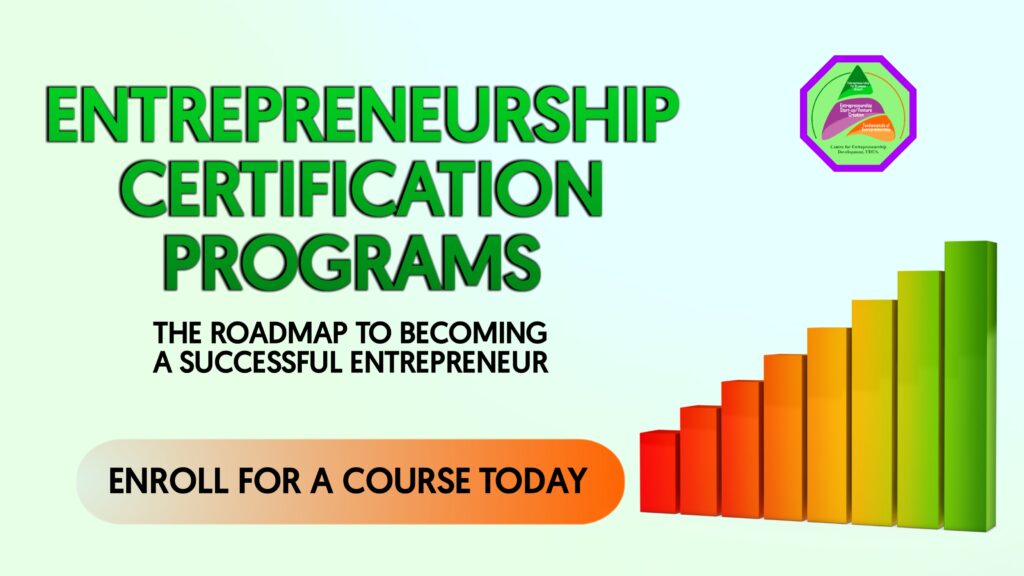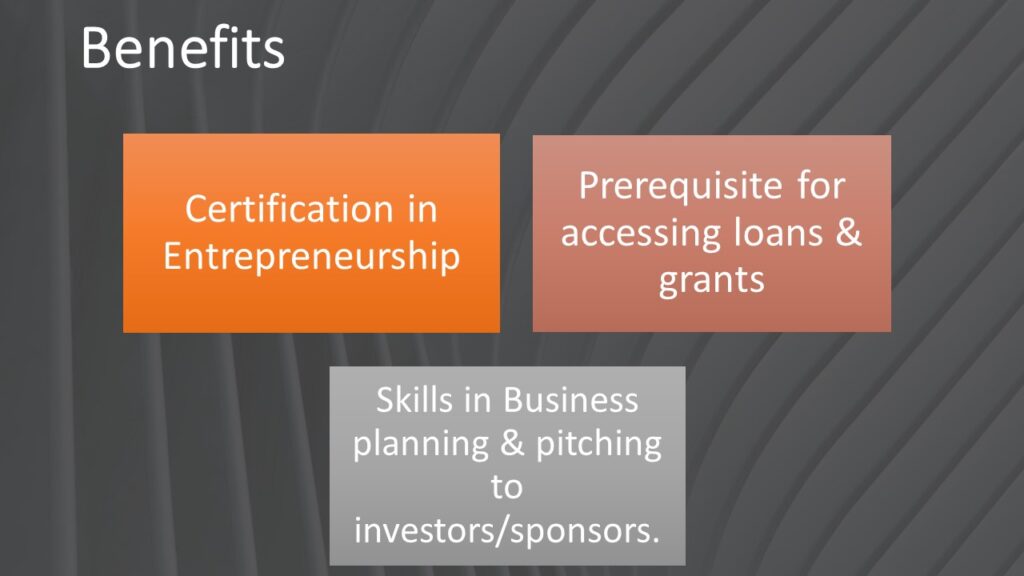
AVAILABLE COURSES
Fundamental Entrepreneurial Skills (FES)
Objectives
- To develop an entrepreneurial mindset (spirit) in the candidates and equip them with skills necessry to think innovative
- To equip candidates with entrepreneurship knwledge that will enable them to initiate innovative idea and or identify opportunity
- To provide new knowledge and expertise leading to the delivery of excellence in the field of entrepreneurship
- To empower students and graduates, irrespective of their areas of specialization, with skills that will enable them engage in income yielding ventures
- To develop competence, know-how, experience, attitude, resources and network required to pursue different entrepreneurial opportunities
Course Contents
- The Nigerian Entrepreneurial Environment: Introduction to Entrepreneurship, Business internal and external environment, Identifying business opportunities and threats, Strategies for exploiting opportunities in the environment, Approaches to addressing environmental barriers, Management of innovation
- Enterprise Management: Essential enterprise management skills, Business ethics & legal matters, Human resources management, Marketing management & modern marketing tools.
- Entrepreneurial Finance: Basics of finance, Developing financial records, Sources of funds.
- Writing a Succesful Business Plan:Writing a business plan, Pitching a business plan


ENTREPRENEURSHIP START-UPS / VENTURE CREATION
Objectives
- To introduce candidates to the key requirements for starting an Enterprise and promote the culture of among them.
- To provide candidate with ample opportunities that will improve their productive capacities of enterprise development skills.
- To develop the innovative idea of the candidates and equip them with skills necessary to start-up and run a business successfully.
- To provide a hand-on, practical guidance to discover and understand critical aspects of entrepreneurship for business start-up and growth.
- Helping candidates to acquire entrepreneurship skill for job or venture creation.
Benefits

Course Contents
BUSINESS DEVELOPMENT (Essential Enterprise management Skills. Business Documentation. Business Ethics. Legal matters. Feasibility Analysis of New Venture. Business plan/ pitching. Business model Canvas)
FINACIAL MANAGEMENT: Basics of Finance:. Start-up Cost. Break-even point, fixed and variable costs. Accounting/Book Keeping . Sources of Funds
MARKETING: Marketing Strategies. Modern Marketing Tools. Unique Value proposition. Digital Marketing.
PRACTICAL FIELDS Business incubation /start-up Lab.
Duration & Cost

PUBLIC SPEAKING & PRESENTATIONS
Objectives
This course is designed to help individuals develop the skills and confidence necessary to excel in public speaking. Whether you are a novice or an experienced speaker looking to enhance your abilities, this course provides a comprehensive foundation for effective communication in various public speaking contexts. Participants will learn strategies for crafting compelling speeches, improving delivery techniques, managing anxiety, and engaging with different audiences..
- Understand the fundamentals of effective public speaking.
- Develop and organize persuasive and informative speeches.
- Improve vocal and nonverbal communication skills.
- Manage anxiety and build self-confidence in public speaking.
- Adapt communication styles for different audiences and settings.
- Utilize visual aids and technology effectively.
- Construct and deliver impromptu speeches.
- Provide constructive feedback to peers for continuous improvement.
- Analyze and critically evaluate speeches.
- Apply ethical principles to public speaking
Benefits
Learning public speaking offers numerous personal and professional benefits that can significantly enhance your life and career. Here are some of the key advantages:
Improved Communication Skills: Public speaking helps you become a more effective and confident communicator in both formal and informal settings. You’ll learn how to articulate your thoughts clearly and persuasively.
Enhanced Confidence: As you practice and gain experience, your self-confidence will grow. Overcoming the fear of public speaking can boost your overall self-esteem.
Better Leadership Abilities: Public speaking is a crucial skill for leaders. It allows you to inspire and influence others, making you a more effective leader in various contexts.
Career Advancement: Effective public speaking is highly valued in the workplace. It can open doors to career opportunities, promotions, and leadership roles.
Stronger Persuasion Skills: Public speaking equips you with the ability to persuade and influence people, making you more effective in negotiations, sales, and advocacy.
Networking Opportunities: Speaking engagements provide opportunities to connect with like-minded individuals, experts, and potential mentors or collaborators.
Increased Knowledge Retention: When you teach or present information to others, you tend to retain and understand the material better. Public speaking can aid in learning and knowledge retention.
Improved Critical Thinking: Crafting and delivering speeches require research and critical thinking skills, helping you become a more analytical thinker.
Effective Problem Solving: Public speaking forces you to think on your feet and respond to questions and challenges in real-time, improving your problem-solving abilities.
Personal Growth: Public speaking can be a transformative experience that pushes you out of your comfort zone, fosters personal growth, and helps you conquer fears.
Influence and Impact: As a skilled public speaker, you can have a positive impact on others by sharing ideas, inspiring change, and raising awareness about important issues.
Public Recognition: Successful speakers often gain recognition and credibility in their fields, becoming thought leaders and experts in their areas of expertise.
Academic and Educational Benefits: Public speaking skills are valuable in educational settings. They can improve your academic performance and help you excel in presentations and discussions.
Advocacy and Social Change: Public speaking allows you to advocate for causes and contribute to positive social change by raising awareness and mobilizing support.
Personal Fulfillment: Many people find public speaking to be a fulfilling and rewarding experience, as it allows them to share their passions and expertise with others.
Course Contents
Module 1: Introduction to Public Speaking
- Importance and applications of public speaking
- Overcoming stage fright
- Setting personal goals
Module 2: Speech Preparation
- Audience analysis
- Topic selection and organization
- Creating strong openings and memorable closings
Module 3: Delivery Techniques
- Voice modulation and projection
- Nonverbal communication mastery
- Managing nervousness and building confidence
Module 4: Impromptu Speaking
- Techniques for thinking on your feet
- Handling Q&A sessions effectively
- Impromptu speech practice
Module 5: Adapting to Different Audiences
- Tailoring content to diverse audiences
- Engaging and captivating listeners
- Handling feedback and questions
Module 6: Visual Aids and Technology
- Effective use of slides and props
- Leveraging technology for impactful presentations
- Avoiding common visual aid mistakes
Module 7: Peer Evaluation and Feedback
- Constructive feedback techniques
- Applying peer feedback for improvement
- Self-assessment and reflection
Module 8: Ethical Public Speaking
- Ethical responsibilities in public speaking
- Avoiding plagiarism and dishonesty
- Ethical considerations in persuasive speaking
Module 9: Special Topics (e.g., storytelling, persuasive speaking)
- Advanced speech techniques
- Storytelling for impact
- Persuasion and influence
Module 10: Final Speech Presentations
- Delivering prepared speeches
- Graduation and feedback celebration
Duration & Cost

PRACTICAL SALESMANSHIP
Course Descriptions
This course is designed to immerse participants in the practical aspects of sales, equipping them with hands-on experience in applying sales principles, strategies, and techniques in real-world business scenarios. The course covers the entire spectrum of sales processes, emphasizing practical activities that facilitate active learning and skill development
Objectives
- Apply sales fundamentals in practical settings and appreciate the importance of sales in entrepreneurship.
- Develop and implement effective sales strategies tailored to different industries and customer segments.
- Execute lead generation techniques and prospect identification in real-world scenarios.
- Utilize various sales techniques and communication skills through hands-on exercises.
- Engage in real negotiation and deal-closing situations.
- Practice objection handling and overcoming common sales challenges.
- Establish and nurture long-term customer relationships through practical activities.
- Leverage technology and CRM tools in practical sales scenarios.
- Explore ethical considerations in sales through real-world case studies.
- Develop, present, and implement a personalized sales plan for a real or hypothetical product or service.

Course Contents
Module 1: Introduction to Practical Sales
- Sales in action: Understanding its significance
- Sales role-play: Simulating real-world sales scenarios
- Types of sales processes: Practical examples
- Sales in the digital age: Leveraging technology in hands-on activities
Module 2: Sales Strategy and Practical Planning
- Practical sales goal-setting and objectives
- Target market exploration: Real-world scenarios
- Developing a practical sales strategy
- Creating a sales plan and its practical implementation
Module 3: Prospecting and Real-World Lead Generation
- Field visit: Identifying prospects and leads in the local market
- Hands-on experience in building and maintaining a prospect database
- Field trip for lead generation: Practical techniques
- Lead qualification and scoring in real scenarios
Module 4: Practical Sales Techniques
- Consultative selling in action: Real-life client interactions
- Solution-based selling through practical case studies
- Relationship selling workshop with live customer interactions
- Presentation and demonstration skills in practical settings
Module 5: Sales Negotiation and Real-World Closings
- On-site negotiation: Hands-on exercises
- Handling objections through role-play scenarios
- Deal-closing boot camp: Real-world simulations
- Post-sale follow-up in action: Customer interaction
Module 6: Sales Technology and Ethical Realities
- CRM tool hands-on experience
- Data-driven decision-making in practical scenarios
- Ethical dilemmas in sales: Real-world case studies
- Professionalism in real sales settings
Module 7: Practical Sales Project
- Each participant will apply course concepts in a real sales project, seeking to achieve practical outcomes for a product or service of their choice.
Assessment:
- Practical activities in real sales scenarios
- Role-play and live demonstrations
- Sales project development and presentation
- Examinations and quizzes based on practical scenarios
DIGITAL & SOCIAL MEDIA MARKETING
Objectives
Understand Digital Marketing Fundamentals
Master Key Digital Marketing Channels
Develop Practical Skills
Apply Data Analytics and Measurement
Build Entrepreneurial Competencies
Promote Ethical Practices
Foster Creativity and Innovation
Promote Love, Compassion, and Social Responsibility
Prepare for Real-World Challenges
Facilitate Networking and Collaboration
Assess and Certify Competence
Benefits
In-Demand Skills: Digital marketing is a highly sought-after skill in today’s job market. By learning it, students can enhance their employability or entrepreneurial prospects.
Cost-Effective Marketing: For entrepreneurs, digital marketing provides a cost-effective way to reach a wider audience compared to traditional marketing methods.
Targeted Audience Reach: Digital marketing allows you to target specific demographics and interests, ensuring that your marketing efforts are seen by the right people.
Measurable Results: You can track and measure the effectiveness of your digital marketing campaigns in real-time, allowing for data-driven decision-making.
Global Reach: With the internet, your digital marketing efforts can reach a global audience, enabling entrepreneurs to expand beyond local markets.
Versatility: Digital marketing encompasses various channels, including social media, email, SEO, and content marketing, giving learners a wide skill set.
Entrepreneurial Opportunities: Students can start their own digital marketing agencies or freelance as digital marketers, creating income-generating opportunities.
Adaptability: The digital marketing landscape is continually evolving. Learning it fosters adaptability and the ability to stay updated with industry trends.
Enhanced Communication Skills: Public speaking and communication skills often improve as individuals engage with digital marketing campaigns and analyze their impact.
Community Building: Digital marketing can help build online communities and foster connections with like-minded individuals or customers.
Personal Branding: Students can use digital marketing to establish and promote their personal brands, which can be beneficial in various career paths.
Promotion of Social Causes: For those interested in promoting love, compassion, and social causes, digital marketing offers a platform to raise awareness and drive positive change.
Minimalism and Efficiency: Digital marketing encourages minimalism in terms of resource utilization, making it environmentally friendly and efficient.
Entrepreneurial Mindset: Learning digital marketing can instill an entrepreneurial mindset, encouraging students to think creatively and innovatively.
Global Networking: Through online marketing, individuals can connect with professionals and entrepreneurs worldwide, expanding their network.
Course Contents
Module 1: Introduction to Digital Marketing
- Definition and Importance of Digital Marketing
- Historical Overview
- Digital Marketing vs. Traditional Marketing
Module 2: Digital Marketing Fundamentals
- Website Development and Optimization
- Search Engine Optimization (SEO)
- Pay-Per-Click (PPC) Advertising
- Content Marketing
Module 3: Social Media Marketing
- Overview of Major Social Media Platforms
- Creating Engaging Content
- Social Media Advertising
- Influencer Marketing
Module 4: Email Marketing
- Building an Email List
- Creating Effective Email Campaigns
- Email Automation
- Measuring Email Campaign Success
Module 5: Content Creation and Marketing
- Content Strategy
- Blogging and Article Writing
- Video Marketing
- Visual Content (Infographics, Images)
Module 6: Analytics and Data Analysis
- Google Analytics
- Social Media Insights
- Key Performance Indicators (KPIs)
- ROI Measurement
Module 7: Mobile Marketing
- Mobile Website Optimization
- App Marketing
- SMS Marketing
- Location-Based Marketing
Module 8: E-commerce and Online Sales
- Setting up an Online Store
- Shopping Cart Optimization
- Payment Gateways
- Customer Relationship Management (CRM)
Module 9: Digital Advertising and Budgeting
- Display Advertising
- Remarketing/Retargeting
- Budgeting and ROI Calculation
- Ad Campaign Optimization
Module 10: Strategy and Planning
- Creating a Digital Marketing Plan
- SWOT Analysis
- Setting SMART Goals
- Monitoring and Adaptation
Module 11: Entrepreneurship in Digital Marketing
- Opportunities in the Digital Marketing Industry
- Starting a Digital Marketing Agency
- Case Studies of Successful Entrepreneurs
Module 12: Ethical and Legal Considerations
- Data Privacy and GDPR
- Copyright and Intellectual Property
- Online Advertising Regulations
Module 13: Final Projects and Presentations
- Students work on real-world digital marketing projects
- Presentation of Projects
- Peer Evaluation
Module 14: Graduation and Certification
Duration & Cost


